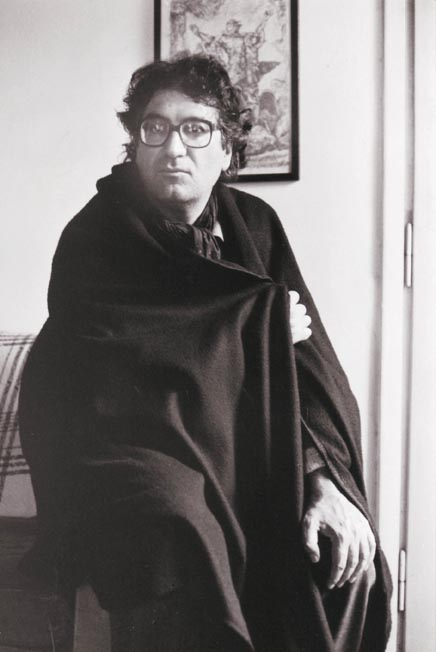 Dario Bellezza (5 September 1944 – 31 March 1996) was an Italian poet,
author and playwright. He won the Viareggio, Gatto, and Montale prizes.
Dario Bellezza (5 September 1944 – 31 March 1996) was an Italian poet,
author and playwright. He won the Viareggio, Gatto, and Montale prizes.Queer Places:
Campo Cestio, Via Caio Cestio, 6, 00153 Roma RM, Italia
 Dario Bellezza (5 September 1944 – 31 March 1996) was an Italian poet,
author and playwright. He won the Viareggio, Gatto, and Montale prizes.
Dario Bellezza (5 September 1944 – 31 March 1996) was an Italian poet,
author and playwright. He won the Viareggio, Gatto, and Montale prizes.
Dario Bellezza was born in Rome on 5 September 1944. After his studies at a liceo classico in his native city, from which he graduated in 1962, he worked for several Italian literary and poetry magazines: Paragone, Carte segrete, Bimestre, Periferia, and Il Policordo.[1]
Bellezza entered the Roman intellectual world in the mid-1960s when, thanks to literary critic and writer Enzo Siciliano, he became increasingly close to Sandro Penna, Aldo Palazzeschi, Attilio Bertolucci, Alberto Moravia, and Elsa Morante, who eventually became a confidant.
The decade from 1950-1960 was a period in which the working class, the Italian Communist Party, the trade unions, and all their hopes for radical cultural change were dramatically defeated. The political and economic growth of the Christian Democrat middle class and the new, changed Freemasonries prevailed.
Bellezza, thus, lived in a political-cultural era convulsed by the ideological confrontations of the 1960s and the subversive ideological line of the aggressive neoavant-garde that struggled against conventional linguistic codes.[2]
From the early 1960s on, Bellezza collaborated with the magazine Nuovi argomenti, becoming associate director shortly before his death.
When Invettive e licenze (Invectives and Licenses) appeared in 1971, it was hailed by Pier Paolo Pasolini in his introduction: "Here is the best poet of the new generation". Invettive e licenze, notable for its technical rigor, depicts people overwhelmed by bitterness, shame, feelings of guilt, alienation, scandal, and sexual perversions. The poems also express a constant, thinly veiled desire for death.[3]
Since 1978 has begun a productive collaboration with Pellicanolibri, with the series "Inediti rari e diversi", publishing texts by Alberto Moravia, Renzo Paris, Gianfranco Rossi, Goliarda Sapienza and Anna Maria Ortese, for her with Beppe Costa and Adele Cambria he will manage to enforce for the first time the Bacchelli’s law, an annuity which is intended to poets and writers in need.
Bellezza was a bourgeois, as were many other intellectuals, but differed from them, according to Pasolini, in being "the first poet bourgeois to judge himself". Pasolini had a profound affection for Bellezza's work and his artistic experience. The young poet reciprocated this feeling, and also was deeply grateful to Elsa Morante for what he called his poetic apprenticeship.[4]
In 1981, enraged by the publication of the "obscene" photographs of the dead Pasolini "in tutta la loro gelida, disarmante crudezza... nudo, esposto, con tutte le macabre ferite esibite del suo 'sacro' martirio" (in their icy, disarming rawness... naked, exposed, with all the grisly wounds exhibited of his 'sacred' martyrdom), Bellezza wrote the biographical essay Morte di Pasolini (Death of Pasolini).[5][6]
In 1983, he published io (me), the lack of capital letters intentional. In this work, Bellezza lightly but concretely describes his everyday life and the mediocre desperation of his loves in ample detail.
The difficulty of homosexual life in Rome, particularly the requirements of secrecy and clandestinity of the love act, is a staple of Bellezza's poetic and prosaic writing. In Bellezza's first novel, L'innocenza (Innocence, 1971), Nino, the protagonist, consciously chooses the perdition and corruption of a living homosexual hell. In Bellezza's infernal world, homosexuality can be nothing else but prostitution and neurotically masochistic obsessions: in Lettere da Sodoma (Letters from Sodom, 1972), his conclusion is that everything is Hell and that the only salvation is the systematic refusal of the self.[10][11]
Bellezza won the Viareggio prize in 1976 for Morte segreta, the Gatto prize in 1991 for Invettive e licenze, the Montale prize in 1994 for L'avversario, and for the play Ordalia della croce he received the Fondi la Postora prize in 1994.
He died of AIDS in Rome on 31 March 1996. That year, a poetry prize was established in his name.
My published books:
https://en.wikipedia.org/wiki/Dario_Bellezza